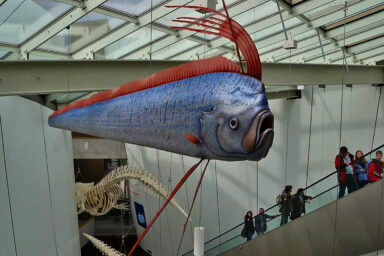Tightened Federal Water Protections Won’t Slow Some Projects
PICKS are stories from many sources, selected by our editors or recommended by our readers because they are important, surprising, troubling, enlightening, inspiring, or amusing. They appear on our site and in our daily newsletter. Please send suggested articles, videos, podcasts, etc. to picks@whowhatwhy.org.
Tightened Federal Water Protections Won’t Slow Some Projects (Maria)
The authors write, “The Biden administration is moving to tighten oversight of projects that benefited from Trump-era loosened water protections, but some projects — including a controversial Georgia mine — will likely be able to escape new scrutiny. It’s the latest twist in a long-running dispute over the scope of the Clean Water Act, with each new administration aiming to shift which waterways require federal protections. The new guidance aims to diminish the impact of Trump-era environmental rollbacks, which included eliminating federal protections for numerous small streams, wetlands and other waterways.”
Martin Luther King Jr.’s 1950s ‘Advice for Living’ Column Parallels Black American Challenges Then and Now (Dana)
From Ebony: “In 1957, Rev. Dr. Martin Luther King wrote a monthly column for Ebony called ‘Advice For Living.’ Readers sent in their most burning questions in hopes that MLK would reply with transformative advice. Although Black Americans during the time of Dr. King had a primary focus of achieving liberation and equity in the face of Jim Crow, there were various intersectional issues that still impacted pockets of our community. In the column, the reverend tackled a broad range of topics such as marriage, sex, politics and race. Unfortunately, the ‘Advice For Living’ ended in 1958 after Dr. King was stabbed in New York City. His column addressed some of the most important issues of that era through the vantage point of societal standards of the time. Over six decades since these columns were written, we analyze the pertinence of a couple of his responses and how they withstand the times today.”
Youngkin Taps Critical Race Theory Opponents to Lead Public Education in Virginia (DonkeyHotey)
From the Virginia Mercury: “Gov.-elect Glenn Youngkin has named two women with track records of opposing ‘critical race theory’ — a once obscure collegiate field that’s become a conservative catch-all term for racial equity and diversity initiatives in public schools — to top posts at the Virginia Department of Education. Jillian Balow, formerly Wyoming’s elected superintendent of public instruction, will take on the same job in Virginia, Youngkin announced in a news release Thursday. Before stepping down to join Youngkin’s administration, Balow supported a proposed Wyoming bill that would require K-12 schools to publish lists of instructional materials, among other provisions. According to the Wyoming Tribune Eagle, Balow endorsed the bill alongside its patrons, one of whom described the legislation as an effort to prevent ‘the indoctrination found in the critical race theory curriculum that has been pushed by the far-left and has found its way into some classrooms.’”
Boston’s New Mayor Tries a Different Tack on Homelessness (Reader Jim)
The author writes, “Homeless encampments don’t have a long history in Boston — the city’s often-frigid climate can be awfully hostile to rough sleeping. So the tent city at the intersection of Massachusetts Avenue and Melnea Cass Boulevard, a site known as Mass. and Cass, stands as a testament to the brutal tenacity of the affordable housing crunch, Covid-19 pandemic and opioid epidemic. At its peak size, about 300 people called Mass. and Cass home, and even during the depths of the New England winter scores of tents remained. The city has had trouble responding to the rise of visible homelessness around the South End.”
Norway Blows Up Hydro Dam to Restore River Health and Fish Stocks (Tamonda)
The author writes, “A dam that has blocked the Tromsa River in Norway for more than 100 years was blown up with dynamite [last] week, freeing migratory routes for fish. … Built in 1916, the seven-metre high dam in the small town of Fåvang, in Innlandet, east Norway, has not been in use for more than 50 years. The Tromsa is a tributary of the Lågen River, which feeds into Lake Mjøsa, Norway’s biggest lake. Campaigners say removing the dam will help fish in the area thrive again, including grayling, burbot, Alpine bullhead and common minnows. It is hoped the main beneficiary will be the lake-dwelling trout, which can weigh more than 10kg and feeds in downstream lakes and the Lågen. Until now, the fish have only been able to live and spawn in the lower 950 metres before the dam, whereas they will soon be able to swim 10km upriver.”
Clyde Bellecourt, AIM Co-Founder and Longtime Civil Rights Leader, Dies (Dan)
From the Star Tribune: “Clyde Bellecourt, one of the most important leaders in the history of the American Indian struggle for civil rights, died Tuesday at his home in Minneapolis. He was 85. Peggy Bellecourt, his wife, confirmed his death and said the cause was cancer. With Dennis Banks and others, Bellecourt was a co-founder in 1968 of the American Indian Movement (AIM), which began as a local organization in Minneapolis to grapple with issues of police brutality and discrimination against Native Americans. They were soon joined by his brother, Vernon Bellecourt.”
The Correct Way to Hang Toilet Paper, According to Science (Sean)
The author writes, “There are two ways to hang toilet paper: 1) over (with the loose end draped over the top) and 2) under (with the loose end hanging inside next to the wall). Most offices hang it ‘over’ but I’ve been in many restrooms where it’s been hung ‘under.’ The over/under issue is surprisingly controversial and was allegedly the topic that generated the most letters to Dear Abby on a single subject. I’m here today to remove that controversy forever. According to science, the correct way to hang toilet paper is ‘over.’ Why? Because ‘under’ vastly increases the possibility that food-poisoning bacteria will spread from the restroom to the rest of the workplace.”



